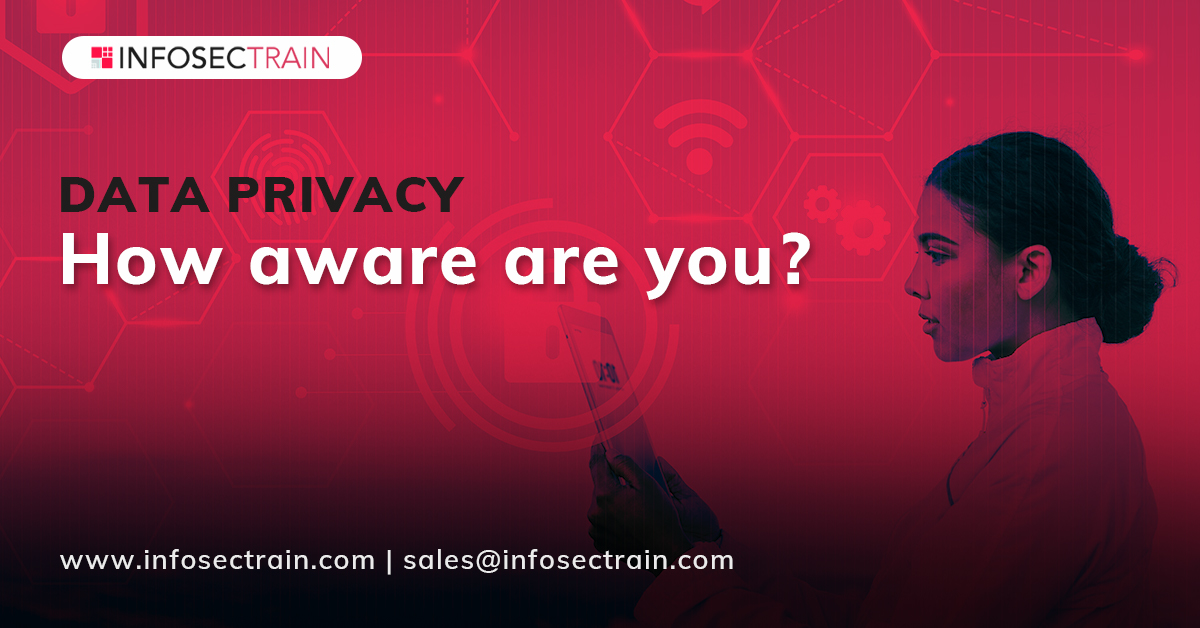Data Privacy: How aware are you?
We live in a digital age with many technological advancements where data is present in obvious ways. Digital has dematerialized the world because the things people necessitate are no longer subject to physical stuff but are satisfied by digital technology. With Social, Economic, and Governmental pursuits progressively carried out online, the personal data flow is expanding in a steady manner, raising issues to its storage and use. Data has become like a Golden goose for the nefarious elements of cyber civilization. Data Protection legislation’s hurdle is handling the risks and addressing the concerns without restraining or eliminating potential interests like Cloud services, Internet of Things, Big Data, and increased connectivity through 5G networks. The position of Government and the enterprise in defending online data is predominant that must be performed with a good deal of trust and confidence.
Data privacy or information privacy is referred to as a data security section that deals with the proper management of data – consent, notice, and regulatory obligations. Data Privacy means handling personal data with respect for Confidentiality and Anonymity that applies to all the data.
The Importance of Data Privacy
Hackers are after the personal information that your Organization stores. Data breaches regularly expose millions and billions of data records that criminals use to create Fraud or Identity Theft. When a security breach results in a Privacy failure, it is not just an internal problem. Failing to ensure data Privacy can cause lots of troubles like:
- A simple leak of a series of personal data can cause lots of serious issues for your organization’s financial well-being and its reputation since public, investor, and customer trust is irreparably damaged.
- Data is one of the most significant resources an organization possesses. With the ascent of the data economy, organizations find huge incentives to gather, share, and utilize data. Openness in how organizations demand assent, obey their compliances, and deal with the data they’ve gathered, is essential for building trust and responsibility with clients and accomplices who anticipate security.
- Privacy is the privilege of a person to be liberated from excluded supervision. Data Privacy can be defined as a Distinct Human Right. In order to securely exist in one’s space and openly express one’s assessments away from public scrutiny is basic to living in a democratic civilization.
- A personal data leak can cause significant damage to a company’s reputation and bring along penalties, which is why it is very important to comply with personal data protection regulations.
Difference Between Data Privacy and Data Security
Generally, people expect privacy. Contrary to popular belief, Data Privacy is not the same as Data Security, but they are tied together:
- Data Security is a subset of Data Privacy. If Data Privacy is the umbrella, then Data Security can be referred to as one part of the umbrella canopy.
- Data security is the fortress of safeguarding the data, whereas Data Privacy is legislation as it is the protection of that data from various levels.
- Data security is defending the data from unapproved access by using encryption, tokenization for cloud, firewalls, passwords. At the same time, Data Privacy incorporates the data security aspect, but it deals with the entire data you are collecting. It understands what data you are gathering, what are you doing with that data, what you are utilizing the data for, who you are sharing the data with, where it is being saved, how long you keep it, and your record’s retention program.
- Data Security defends data from bargain by outer attackers and destructive insiders, while Data Privacy directs how data is gathered, distributed, and utilized.
The Laws and Acts for Data Privacy
The reason for personal data security isn’t just to protect an individual’s data but to defend the basic rights and freedoms of the body associated with that data. Accordingly, the Data protection laws and acts are essential to ensure fair and user-friendly business and services. There are several comprehensive data protection regulations:
- The GDPR: EU Data Privacy Laws: The General Data Privacy Regulation (GDPR) aims to protect EU citizens’ personal data. GDPR gives buyers several claims over their data while additionally setting security commitments on organizations holding their data. For organizations, one formidable phase of the enactment is the prerequisite to react to subject access demands.
- US Privacy Act 1974: US Privacy Act of 1974 maintains restrictions on data held by government agencies.
- HIPAA 1996: Health Insurance Portability and Accountability Act (HIPAA) protects health information.
- GLBA 1999: Gramm-Leach-Bliley Act (GLBA) protects financial non-public personal information (NPI).
- COPPA 2000: Children’s Online Privacy Protection Act (COPPA) protects children’s data (<=12 yrs).
- Privacy Rule 2000: The Privacy rule fortifies HIPAA and safeguards individuals’ private health information.
- SOX 2002: Sarbanes-Oxley Act (SOX) protects the public from Fraudulent practices by corporations.
- FISMA 2002: Federal Information Security Management Act (FISMA) orders agencies to protect data.
- ISO 27001 2013: ISO 27001 functions as a framework for information security management systems.
- CCPA 2020: California Consumer Privacy Act (CCPA) restricts how companies collect and use data.
Data Privacy Best Practices
For Businesses:
- It is very important to create awareness of data security and privacy concerns and techniques among your organization’s employees. You can also organize training on data privacy like the General Data Protection Regulation Foundation during the orientation program, which can be part of the onboarding process for new joiners.
- You must utilize the security tools available free of cost. This comprises encrypted storage solutions, password managers, and VPNs. These small tools are easy to use and install and can significantly decrease vulnerability attacks.
- You must keep your organization’s network under surveillance for suspicious traffic so that you can catch any invasion sufficiently early before any harm is caused.
- You must never miscalculate a hacker’s ability or interest, considering your company’s smaller size or assuming if it’s a startup. Breaches and attacks influence organizations of all sizes, including startups and independent ventures.
- You must also Implement the zero trust model by restricting access to the entire network, have a mindset of ‘trust but verify.’
For Consumers:
- Always use multi-factor authentication if it is available for further safety layers and ensure that important accounts aren’t readily compromised if the passwords are cracked. Various online facilities offer multi-factor authentication for free. You must enable it on your account.
- Know about what spyware in the IoT implies for data protection: this has been one of the greatest network safety accounts of the most recent year and focuses on the significance of keeping all your IoT gadgets updated with the latest security software.
- Always keep a backup of your data and make it a frequent practice. If data storage is ever jeopardized, you can always restore it from the secure backup.
- Always have knowledge and awareness of the webpage and websites where you are entering your data.
Data Privacy training with InfosecTrain
You can opt for the General Data Protection Regulation Foundation or the European Privacy Training-CIPP/E for professional knowledge and in-depth understanding of Data Privacy and Data Protection. We are one of the leading training providers with our well-read and experienced trainers. The courses will help you understand the basic concepts of data privacy and data protection.









 1800-843-7890 (India)
1800-843-7890 (India)